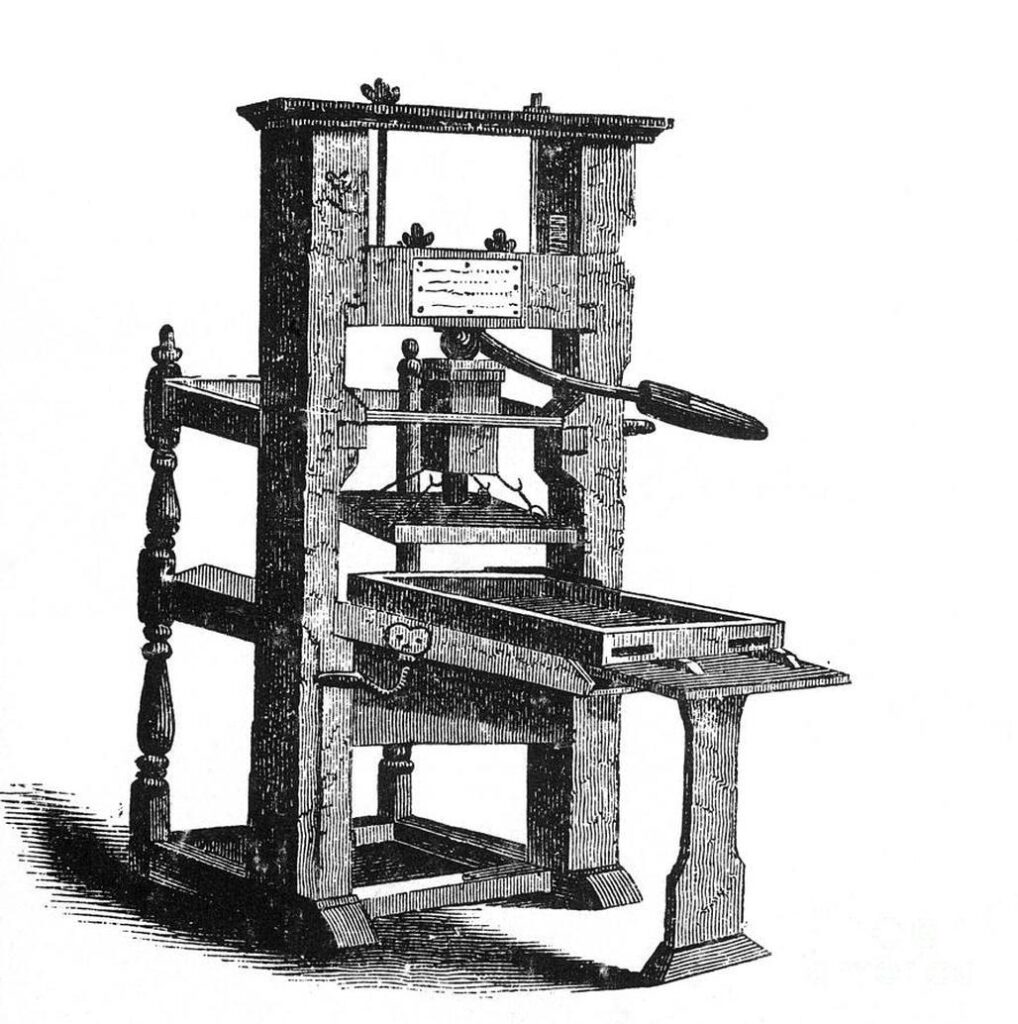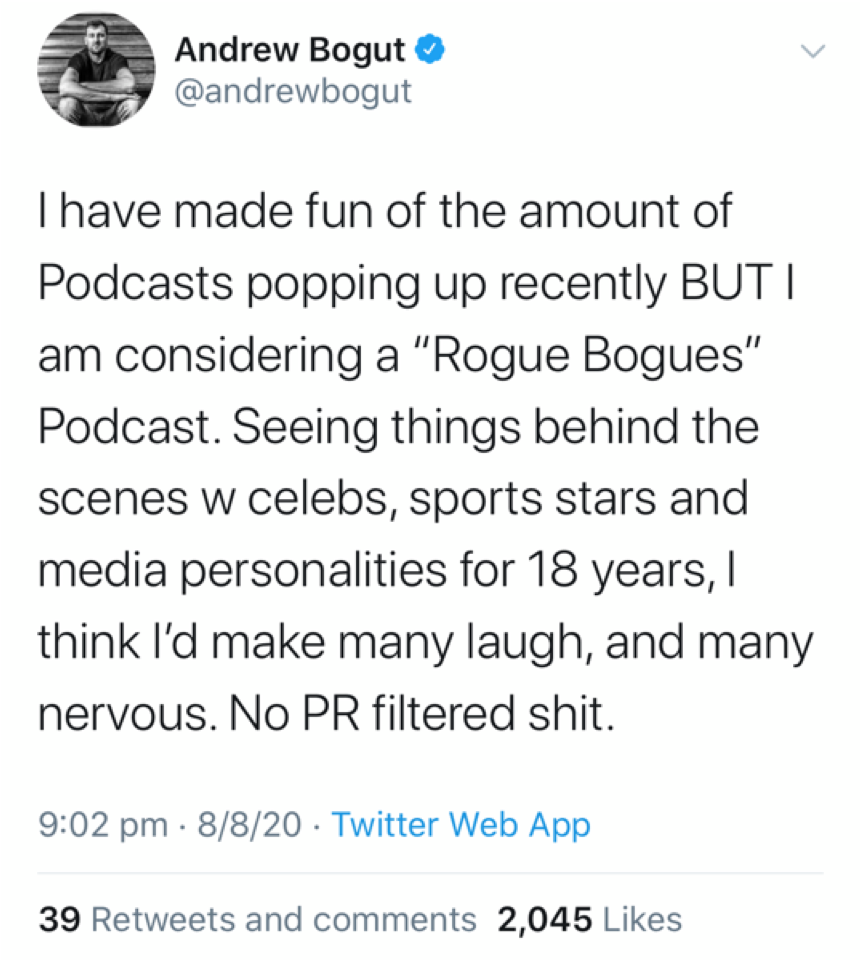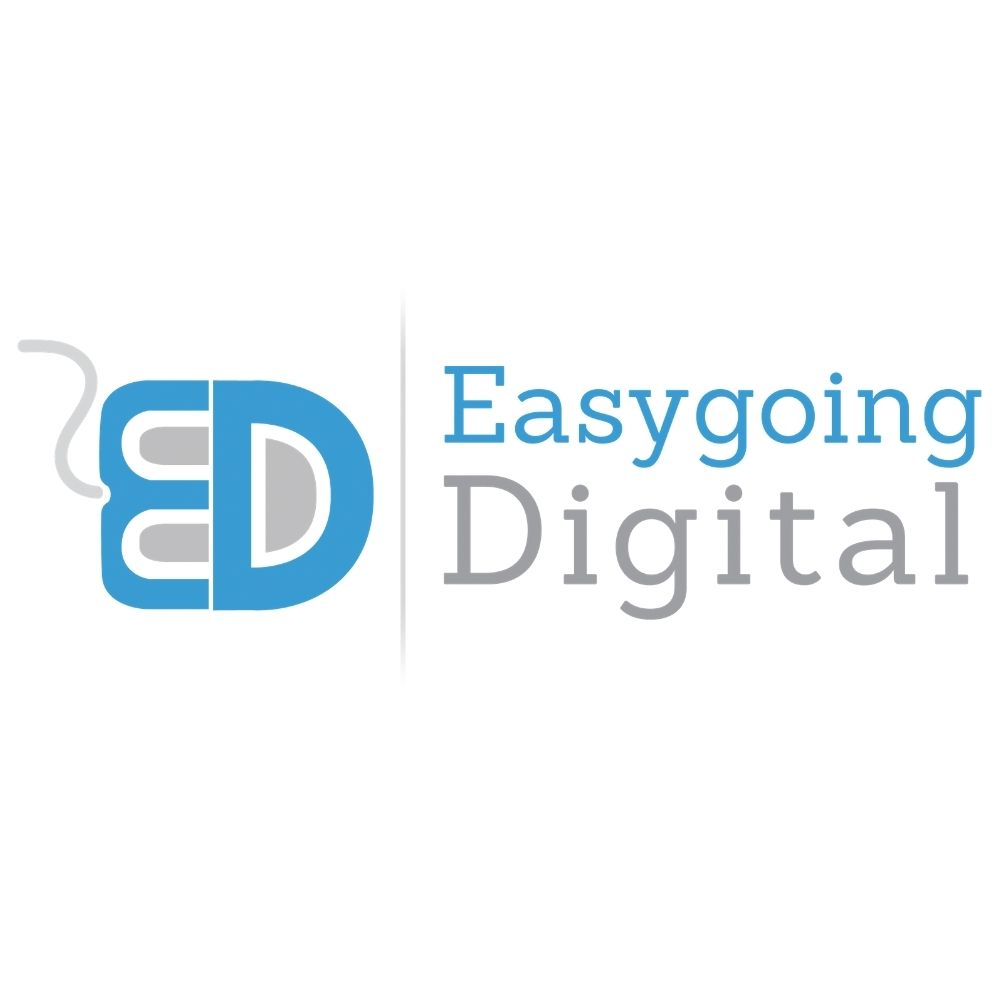But first a story…

Johannes Gutenberg’s Printing Press
Few inventions are credited with having had more influence on the subsequent direction of humanity than Johannes Gutenberg’s printing press.
First unveiled around the year 1440, the printing press was the first of its kind to use moveable metal pieces to create a page’s worth of writing. Gutenberg would then use this template to reproduce a single page. Then re-ordering the pieces and repeating the process until each page had been produced many times. A single version of each page was then collated to form a book. This method was much more efficient at mass-producing written material than anything that had existed previously.
Gutenberg could never have known the historical implications of his new machine. In the years following the advent of the printing press, literacy rates across the Western World skyrocketed. Knowledge or information was no longer confined to the affluent, who had previously possessed the majority of manuscripts and literature. Gutenberg’s method lifted the constraints of laborious and difficult manuscript reproduction, allowing many more books to be created than ever before.
From this point, alternative ideas began to spread rapidly throughout society.
Many historians credit the invention of the printing press as catalysing such revolutions as The Enlightenment, Renaissance, and Protestant Reformation.
After the mass-adoption of the printing press, the implications for the prevailing political order throughout Europe were massive. Never before had a single innovation had such influence on the dissemination of information. That is, it could be argued, until now.
Speaking about the digital dissemination of the spoken word in 2017, prominent Canadian Psychologist Jordan Peterson said that “…maybe it is a Gutenberg revolution because it allows the spoken word to have the same reach and longevity as a book.”
“For the first time in human history, spontaneous speeches can reach an infinite audience for an unspecified duration of time and maybe it’s easier for people to listen than it is for them to read.”
By extension, the themes Professor Peterson mentioned ring true for podcasts. We are yet to know what societal implications will come from their widespread endorsement. Fewer constraints are placed around the dissemination of information than ever before. Podcasting takes the impact of Gutenberg’s printing press, such as the decentralisation of authoritative information, and builds upon it further.
It is for this reason, now is the time to add your voice to the broader discourse. More tools exist than ever before to communicate your original ideas to your target audience. Swiss Psychiatrist Carl Jung spoke of the need for each of us to individuate or become distinct from one another, in order to meet the increasingly complex challenges society presents us. I believe that podcasts are the single greatest tool for individuation we have available to us.
In this article, to demonstrate the importance of starting a podcast, I will be discussing three central points. They are:
-
The power of the podcast medium and its potential impact on the course of history
-
Why podcasting is one of the most efficient forms of meaningful communication and an essential tool to make your voice heard.
-
Podcasting is a worthwhile pursuit, regardless of how saturated the market is.
The power of the podcast medium and its potential impact on the course of history
Gutenberg’s printing press fundamentally changed the way that information was gathered and passed on.
Prior to its advent, opportunities for advanced education were limited only to those who could read and access literature. Arguably, podcasting, YouTube and the distribution of the spoken word will further build upon Gutenberg’s legacy.
Implications of the printing press such as the decentralisation of authoritative information and an increase in access to educational material are further amplified with the growth of podcasting.
One major benefit that podcasting adds is that in order to access the desired information, one does not have to be able to read.
As with the introduction of Gutenberg’s press, this represents a paradigm shift, as it further minimises the restrictions placed around who has access to particular information.
It is estimated that as high as 17% of the population experience a form of dyslexia. Prior to the rise of podcasting as a popular medium for communication, many of these people did not have easy access to the many resources containing a wealth of information in the form of the written word. Now, people with reading difficulties can access information across a broader range of subjects, without subjecting themselves to the difficult task of reading. In this way, podcasting is normalising a greater range of methods for transferring information by audio.
Furthermore, as access to reliable internet increases in coming years and developing economies grow and take lessons from established economies, podcasting stands out as an incredible tool for educating the masses without requiring a fully literate population.
The rapid growth of podcasting experienced recently in developing economies such as India and Peru is evidence of this rising utility.
It was only September 2012 that John Lee Dumas of Entrepreneurs on Fire began the first-ever daily podcast. Less than eight years later, many people around Australia and the world rely on this medium to stay informed during the COVID-19 pandemic. According to recent research from podcast distributor Deezer, 38% of Americans have turned to podcasts to assist with their mental health during the COVID-19 pandemic. It is impossible to say where the growth of podcasting ends as a medium. However, it is clear from this point, that it is becoming one of the premier forms of information distribution.
Why podcasting is one of the most efficient forms of meaningful communication and an essential tool to make your voice heard.
Prior to the advent of podcasting and prevalence of other digital content forms, books were seen as the primary form of communicating information of greater depth.
Shorter written formats allowed for the distillation of particular ideas, yet it was only within a book that these ideas could be properly contextualised in a broader sense.
In today’s busy world, podcasts represent a much more efficient way to get across information without sacrificing depth. Dan Carlin’s Hardcore History podcast is one such example of how podcasts are able to convey the same depth as a book, whilst adding many more features that were previously not possible due to constraints around the presentation of the written word. His podcast is one of the most decorated in history, yet the format he has implemented would have been unheard prior to the digital revolution. His series sometimes covers over 15 hours on topics such as the World Wars, Genghis Khan’s Mongolian Empire and many more. Due to this, people who would have been previously put off by the size of the book needed to convey so much information are able to learn in a more accessible and appealing form.
In the Twentieth Century, Swiss Psychiatrist and father of modern psychology Carl Jung spoke of the process of individuation.
Jung described that individuation is the process where the individual self develops out of an undifferentiated unconscious. That is to say, the way in which each of us develops as distinct from one another.
Jung argued that in order to face the increasingly complex challenges of the world, each of us would need to individuate in order to be able to provide innovative solutions that meet the needs of a changing world.
I believe that podcasting is the best tool we have for available for individuating, as it allows us to develop our ideas as efficiently, deeply and distinctly as any other mechanism we have available.
Not only is speaking much more efficient than writing in terms of getting vast amounts of information documented and dispensed, but podcasts trade on the currency of connection. They require a level of thought that inherently develops your perspective over time. There are many benefits that come from developing this perspective. You will enhance your scope of influence, crystallise your professional legacy and foster relationships that would have otherwise been impossible, to name a few.
All around the world, we see people crying out for the opportunity to make their voice heard.
With podcasting, anyone with recording equipment and internet access is afforded this opportunity. Global movements such as the ‘Me Too’ and ‘Black Lives Matter’ movements have advocated for increasing diversity in the representation of different perspectives within broader society. We now have the technology which allows us to do this, the next step is convincing everyone that your voice that it’s worthy of being heard. Everyone’s unique challenges and perspective has something to offer the world, podcasting is one of the best ways to get it out to an audience.
Philosopher Joseph Campbell said, “the cave you fear to enter holds the treasure you seek.”
Podcasting allows for a level of intellectual exploration that expedites this process like nothing else we have available.

It seems Australian Basketballer Andrew Bogut changed his tune!
Podcasting is still a worthwhile pursuit, regardless of how saturated the market is
Some may argue that the podcasting market is becoming increasingly saturated.
They would argue that it’s too late to start a podcast, or that it’s become cliché, but this was never an argument made for earlier forms of content such as books or documentary filmmaking.
As with then, the focus should be on the content itself, not the format.
Quality information provided in a way that’s relevant, clear and distinct to the presenter is always unique and entertaining, regardless of the format.
As of November 2020, there are over 1.62million podcasts in existence.
Sharp growth in the medium is evidenced by Apple reporting this number to be around 550,000 in June of 2018. Indeed, this amounts to over 41million podcast episodes (approx. 25.30 episodes/show).
On the surface, these statistics seem to suggest great difficulty in breaking through in the podcast market. However, when we break down the numbers, a different picture emerges.
In June of 2018, the number of podcast episodes was 18.5million (approx 33.64episodes/show). This suggests that podcasts are experiencing a drop-off in the number of episodes released per podcast. Indeed, when we look at the data, this is supported.
According to Podnews, only 42% of podcasts are currently active (November 2020).
That is to say; they have published an episode in the last 90 days. Furthermore, only 38.31% of podcasts have over ten released episodes. (As of November 2020)
This data shows that although a significant number of people have adopted podcasting as a medium in recent times, it is a relative few who stay with it and establish themselves as prominent.
It is not a flaw of the medium that it has been widely adopted.
If you can produce information that stands out as being exceptional in your area of interest or expertise, podcasting success will inevitably follow.
If we look at the way people consume information these days, the value of a podcast and the many different forms of content that it can help to produce becomes obvious.
Podcasting also allows for someone to listen and consume information whilst completing another task.
Whether it be commuting to work, getting exercise or doing chores around the house, podcasts allow your audience to be metaphorically transported to a place they’d rather be, even whilst completing an otherwise menial task.
It is often said that the common attention span is decreasing. This may be true; however, habits show that when we find someone or something we like to listen to, we want to consume as much of it as possible. Netflix and other streaming services have changed the way television shows are made. No longer is the story ark of the episode written to climax around the advertising breaks; it’s the end of the episode which demands the greatest cliff-hanger to continue the viewers binging on a particular show.
This reflects our changing habits to consume content from the same source for much longer than had previously even been possible with the arbitrary time constraints placed around traditional media.
We may be experiencing a shortening attention span for new sources of information, yet our hunger for depth is growing when we find something we like. In order to circumvent this decreasing attention span, we can distil elements of a podcast into shorter pieces of content which can form the function of grabbing attention. These can be snippets, videos, graphics for social media, amongst many more.
However, if we focus only on these shorter content forms, we won’t be able to provide the depth of information that our audience is seeking if they do decide they like our material.
Podcasting is here to stay what will your contribution to the conversation be?
For those interested in developing your inner voice and perspective, a podcast must be pursued.
Their widespread adoption as a trusted source of information has started an information revolution, comparable to that started by Johannes Gutenberg and his nascent technology.
Recent times have even seen the emergence of the internal or private podcast. These aren’t even released to the public and require an existing audience. This shows the growing utility of podcasts beyond even the “traditional” marketplace.
To ignore podcasts capacity and utility in the modern landscape fails to recognise our increasing desire for information of quality and depth presented with audio. It’s impossible to say what changes will come from the rise of podcasts and other content forms centred around audio. However, plotting current trends suggests they will get to the point of ubiquitous utilisation.
For those who want their voice to be heard, it is a case of whether you would like to start now or miss out on quality time spent developing the intellectual legacy you want to leave on the world.
